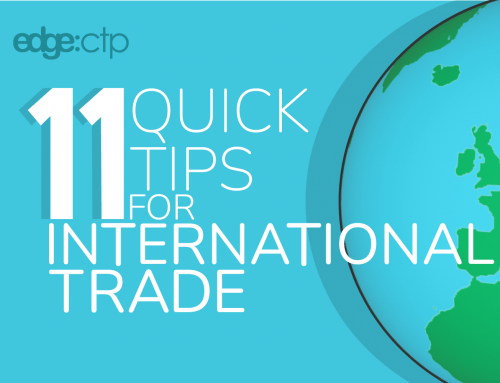Learn How to Conduct Market Research:
Learn how to tell if there’s a market for your product in overseas markets and countries.
Click here to listen to the audio blog version.
Ask An Expert:
Discussion with renowned global trade expert Murdo Beaton and Abdul Mann, creator of the cloud-based export solution EdgeCTP.
Geoff:
How can I tell if there is a market for my product overseas?
Murdo:
Firstly, you have determined if your company is ready to export; is capable of exporting; you’ve satisfied yourself that you would be able to sustain an overseas business model, and your product is compliant for exporting (i.e. you’re allowed to export it and that there is no licensing or government restrictions preventing its export). Once, that’s done you can now consider whether and where there is a market for your product aboard.
Secondly, since there is likely to be a market for your product in many overseas destinations, make a list of the ‘potential’ markets or countries you ‘think’ your product will be most suited to. Rank these markets/countries against:
- Culture + Compliance
- Their acceptance for your product
- Are they allowed to receive your product
- How happy are you to deal with the people in the market
- Rank: 1=Poor to 5=Outstanding
- Business Practice
- How easy is it to do business there
- What are their payment terms
- In case of issues, how easy is it to get legal assistance
- Rank: 1=Hard to 5=Simple
- Market Opportunity
- How big is the market (potential sales)
- How many avenues exist to getting your product into the market
- Rank: 1=Tiny to 5=Massive
- Cost of Entry
- How much will it cost to get your product in-market (i.e. cost of sale)
- Will any foreign currency exchange rate work against you
- How much will it cost to go on a trade mission to the country/market
- Rank: 1=Massive to 5=Tiny
Sort the ranked potential country/market list into a priority that makes you say:
“Yes, out of potential markets, here are the one or two that we’re very comfortable with in terms of being able to do business with them.”
Compliance checks in the market are critical, because if you’re not allowed to sell your product in that market, then there is no need to waste time and energy researching that market – move onto a more compliance market place. You can check this out by looking at the government compliance checklists (e.g. https://www.gov.uk/guidance/beginners-guide-to-export-controls).
Abdul:
So what you’re saying is that we should cherry pick the ones we want to go for because as they say, nothing is for everyone. In which case you’ve got to find the few people that really want to buy your product; are interested in your product; are allowed to buy your product, and then want to tell others about your product. So, in order for you to be able to do that you need to do a level of research to find out, what are those markets that you want to cherry pick.
But, if we can roll back a little bit, what are the mechanisms that people could use to start looking at the bigger picture of, which ones are going to be the markets I want to look at? Would you be able to use the internet, Google your way through it? Would you follow your competitors and see what market places they were in? Or would you go to a market research agency to ask them? Or would you consider any of the government agencies like the UK Department of International Trade (DiT) to support you in that? So what do you think is the most attractive, or all of the above?
Murdo:
Identifying what your competitors are doing is of course of huge importance. If your product is compatible with your competitors and they are already enjoying the benefits of an overseas market, the likelihood is that your product may also be able to benefit from that market. However, even if your competitor is enjoying the benefits of a particular market, it is still necessary for you as a business leader to conduct your own research on that market. The research can be at various levels. It can be a feasibility research, which just gives you the basic information, or it can be a more detailed research, which goes right into the nuts and bolts of what you do actually need to be doing in terms of achieving the maximum potential in that market, in the face of competition from your competitors. Yes, there are government agencies (Scottish enterprise, DIT, Chambers of Commerce.) All these agencies have a provision that could be used to help you identify the market.
Yes, of course, the internet is always there, and today the internet is a mass of information, but one thing I would say about the internet on a cautionary note is, one should be careful that the information that is being identified is information that is current and not information that is somewhat outdated. A lot of people use the internet to launch information that sometimes is not necessarily as current as it should be and in some cases is quite misleading(or fake news)! I’m not suggesting that the internet should not be considered as a source of information, just double-check it with other sources.
Our own government agencies provide a lot of information on market research and it is so important to stress the fact that you really shouldn’t be entering a market without doing the proper research, because it’s this information that is critical, to determine whether or not your business is actually going to enjoy a sustainable period of time, in the overseas market.
Poorly conducted market research (i.e. not including at least the points we mentioned earlier) may lead you to fail to launch properly in a chosen market at the early stages, which dampens your enthusiasm, and that dampening of enthusiasm could spread right through your company and they might get somewhat disillusioned about the benefits of going international. So gather the relevant and correct market data on which to base decisions is absolute.
So do your market research; share your analysis findings with others who have an interest in your succeeding in the overseas markets; consider going on trade missions to the market, to double-check the market research locally and see for yourself if you like what you encountered. Then you’ve conducted proper market research for your producting entering the overseas market place.
Geoff:
I hope you enjoyed this. If you’d like more information on international trade, go to www.edgectp.com.






